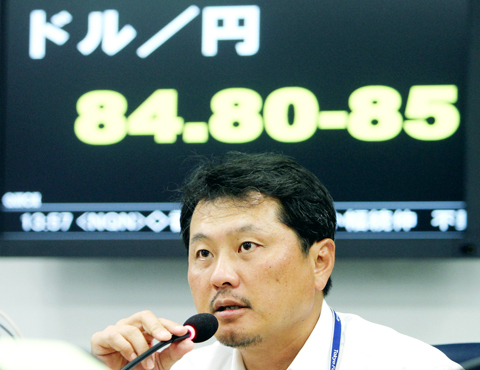A sudden slide in the yen against the dollar yesterday stirred suspicions Japanese authorities intervened for a second time this month to try to prevent the currency’s strength from worsening a faltering recovery.
Traders in Tokyo reckoned a sharp yen drop was likely due to intervention, though the fall happened at levels where authorities were not expected to act.
Some blamed corporate orders for triggering the move and others a rumor — later denied — that Bank of Japan Governor Masaaki Shirakawa planned to resign.

PHOTO: BLOOMBERG
“At first, people thought that was intervention, but it seems like the market was driven one-way by Shirakawa’s rumour and so on. It was a bit like an accident,” said Ayako Sera, market strategist at Sumitomo Trust Bank. “It’s like everyone is afraid of ghosts in the market.”
Japan spent an estimated ¥2 trillion (US$23 billion) on Wednesday last week to combat a rise in the currency to a 15-year high against the dollar.
Japanese Prime Minister Naoto Kan, just re-elected as leader of the ruling party, faces a divided parliament so is keen to curb the strength in the yen, which has hurt Japan’s stock market and sparked the ire of exporters.
But while Japan’s unilateral action last week occurred throughout the global trading day and succeeded in driving the dollar up about 3 percent against the yen, the dollar rise yesterday quickly faded and there was no sign of follow-through action.
Adding to the intervention doubts, authorities confirmed their yen selling on Sept. 15, but declined to comment yesterday.
The dollar surge happened at midday Tokyo time.
The currency rose to as high as ¥85.40 from about ¥84.55 yen in a matter of minutes, and several traders said it looked like the Bank of Japan, which acts on behalf of the Ministry of Finance, had been selling yen.
Last Wednesday’s intervention drove the dollar up to near ¥86 from a 15-year low of ¥82.87, but the yen has clawed back about half those losses.
Despite doubts about whether Tokyo intervened yesterday, analysts expect authorities to step into the market if the yen’s rise accelerates from current levels.
“They sent out a message that they are ready to intervene in the market again if the yen firms beyond what they believe is a proper level,” Seiji Adachi, senior economist with Deutsche Securities in Tokyo, said of Japanese authorities.
“In terms of the economy, it is still going to be tough unless they bring the yen down to 90 to 100 against the dollar. But they probably can’t do that. So they are going to just try to stop it going any higher,” Adachi said.
Showing the uncertainty over whether authorities had intervened, the dollar drifted back toward ¥84.70 as no government confirmation emerged.
Japanese Finance Minister Yoshihiko Noda, who has said Tokyo must gain global understanding about its intervention, and the Bank of Japan declined to comment.

CARROT AND STICK: While unrelenting in its military threats, China attracted nearly 40,000 Taiwanese to over 400 business events last year Nearly 40,000 Taiwanese last year joined industry events in China, such as conferences and trade fairs, supported by the Chinese government, a study showed yesterday, as Beijing ramps up a charm offensive toward Taipei alongside military pressure. China has long taken a carrot-and-stick approach to Taiwan, threatening it with the prospect of military action while reaching out to those it believes are amenable to Beijing’s point of view. Taiwanese security officials are wary of what they see as Beijing’s influence campaigns to sway public opinion after Taipei and Beijing gradually resumed travel links halted by the COVID-19 pandemic, but the scale of

TRADE: A mandatory declaration of origin for manufactured goods bound for the US is to take effect on May 7 to block China from exploiting Taiwan’s trade channels All products manufactured in Taiwan and exported to the US must include a signed declaration of origin starting on May 7, the Bureau of Foreign Trade announced yesterday. US President Donald Trump on April 2 imposed a 32 percent tariff on imports from Taiwan, but one week later announced a 90-day pause on its implementation. However, a universal 10 percent tariff was immediately applied to most imports from around the world. On April 12, the Trump administration further exempted computers, smartphones and semiconductors from the new tariffs. In response, President William Lai’s (賴清德) administration has introduced a series of countermeasures to support affected

Pope Francis is be laid to rest on Saturday after lying in state for three days in St Peter’s Basilica, where the faithful are expected to flock to pay their respects to history’s first Latin American pontiff. The cardinals met yesterday in the Vatican’s synod hall to chart the next steps before a conclave begins to choose Francis’ successor, as condolences poured in from around the world. According to current norms, the conclave must begin between May 5 and 10. The cardinals set the funeral for Saturday at 10am in St Peter’s Square, to be celebrated by the dean of the College

CROSS-STRAIT: The vast majority of Taiwanese support maintaining the ‘status quo,’ while concern is rising about Beijing’s influence operations More than eight out of 10 Taiwanese reject Beijing’s “one country, two systems” framework for cross-strait relations, according to a survey released by the Mainland Affairs Council (MAC) on Thursday. The MAC’s latest quarterly survey found that 84.4 percent of respondents opposed Beijing’s “one country, two systems” formula for handling cross-strait relations — a figure consistent with past polling. Over the past three years, opposition to the framework has remained high, ranging from a low of 83.6 percent in April 2023 to a peak of 89.6 percent in April last year. In the most recent poll, 82.5 percent also rejected China’s